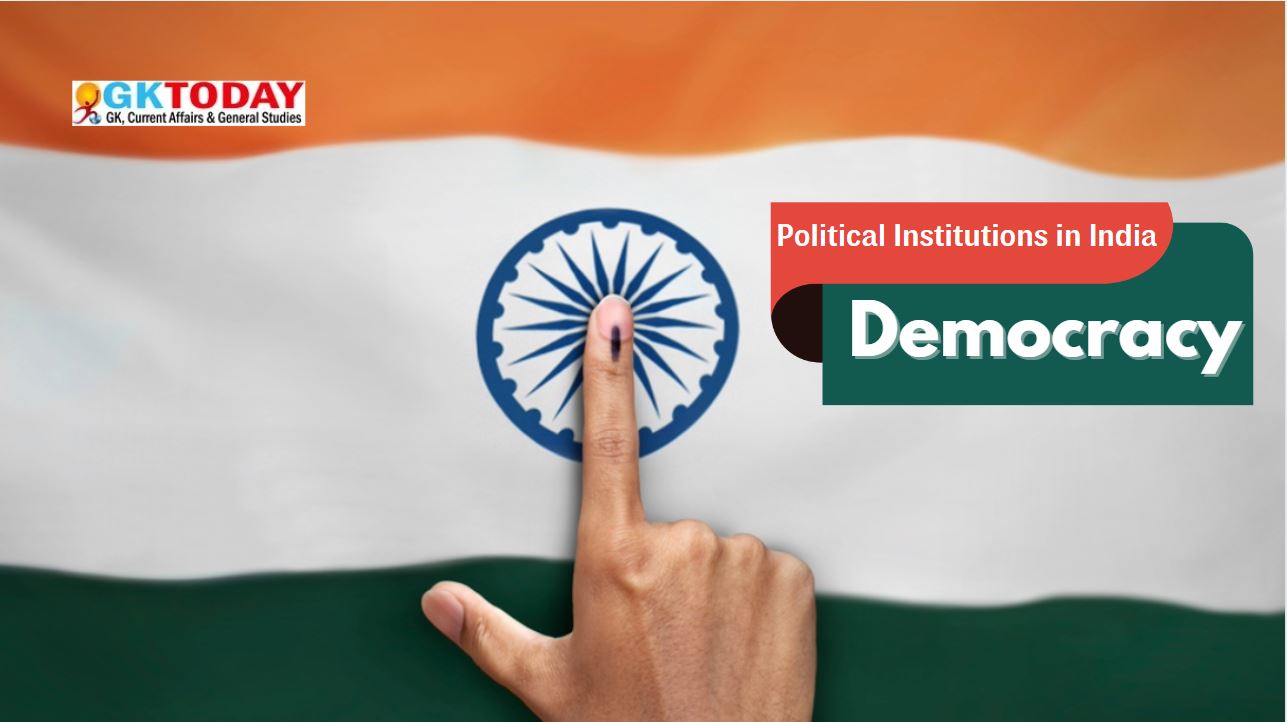Democracy in India [UGC-NTA NET Political Science Notes]
Democracy is a fundamental aspect of India’s political landscape. It is defined as a system of government by the whole population or all eligible members of a state, typically through elected representatives. India, as the world’s largest democracy, showcases a unique blend of constitutionalism and democratic principles.
Definition of Democracy
Democracy can be classified into two main types:
- Direct Democracy: Citizens directly participate in decision-making.
- Representative Democracy: Citizens elect representatives to make decisions on their behalf.
In India, representative democracy prevails, where citizens vote for their leaders in various elections.
Constitutional Framework of Democracy in India
The Constitution of India, adopted on January 26, 1950, serves as the mainstay of Indian democracy. It establishes India as a Sovereign, Socialist, Secular, and Democratic Republic.
Preamble
The Preamble of the Constitution emphasises four key principles:
- Justice: Social, economic, and political.
- Liberty: Of thought, expression, belief, faith, and worship.
- Equality: Of status and opportunity.
- Fraternity: Assuring the dignity of the individual.
These principles guide the functioning of democracy in India.
Features of Indian Democracy
Indian democracy is characterised by several distinct features:
- Universal Adult Franchise: All citizens above 18 years can vote, ensuring inclusivity.
- Multi-Party System: A variety of political parties represent diverse interests, encouraging political pluralism.
- Periodic Elections: Regular elections at central, state, and local levels maintain democratic accountability.
- Independent Election Commission: This body oversees free and fair elections, enhancing public confidence.
These features contribute to a vibrant democratic process.
Fundamental Rights and Duties
The Constitution enshrines fundamental rights and duties for citizens:
Fundamental Rights
Part III of the Constitution guarantees essential rights, including:
- Right to Equality: Equal protection under the law.
- Right to Freedom: Freedom of speech, assembly, and movement.
- Right against Exploitation: Prohibition of human trafficking and forced labour.
- Right to Freedom of Religion: Freedom to practice any religion.
- Cultural and Educational Rights: Protection of minority rights.
- Right to Constitutional Remedies: Access to courts for enforcement of rights.
Fundamental Duties
Article 51A outlines duties for citizens, such as:
- Promoting harmony and the spirit of common brotherhood.
- Safeguarding public property.
- Striving towards excellence in all spheres of individual and collective activity.
These rights and duties form the bedrock of Indian democracy.
Structure of Government
India operates under a parliamentary system of governance:
Parliamentary System
The system features a dual executive comprising:
- President: The constitutional head of the state.
- Prime Minister: The head of government, leading the executive branch.
Bicameral Legislature
The Indian Parliament consists of two houses:
- Lok Sabha: The House of the People, directly elected by citizens.
- Rajya Sabha: The Council of States, representing various states and union territories.
Judiciary
An independent judiciary upholds the Constitution and protects citizens’ rights. The Supreme Court is the highest court of appeal.
Role of Political Parties
Political parties play important role in Indian democracy:
National Parties
Examples include:
- Indian National Congress: One of the oldest political parties.
- Bharatiya Janata Party: Currently a leading national party.
Regional Parties
Regional parties represent local interests, such as:
- Trinamool Congress: Predominantly active in West Bengal.
- Aam Aadmi Party: Focused on governance in Delhi.
Electoral Alliances
Coalition politics is common, with parties forming alliances to secure a majority.
Electoral Process
The electoral process in India is well-structured:
Elections
Elections are conducted every five years for:
- Lok Sabha (House of the People).
- State Assemblies.
Voting System
India employs a first-past-the-post system for Lok Sabha and State Assembly elections. The candidate with the most votes wins.
Voter ID
A voter ID is mandatory for voting, aimed at reducing electoral fraud and ensuring transparency.
Challenges to Democracy
Indian democracy faces several challenges:
Corruption
Corruption undermines public trust and accountability in governance.
Communalism
Tensions between different religious and ethnic groups pose challenges to social harmony.
Political Violence
Issues such as Naxalism, terrorism, and regional insurgencies impact stability and security.
Electoral Reforms
There is a pressing need for reforms to enhance transparency, fairness, and accountability in the electoral process.
Constitutional Amendments Related to Democracy
Several amendments have strengthened democratic principles:
73rd and 74th Amendments (1992)
These amendments empowered local self-governments, establishing:
- Panchayati Raj for rural governance.
- Urban Local Bodies for city governance.
86th Amendment (2002)
This amendment made education a fundamental right for children aged 6 to 14, promoting social equity.
Judicial Interpretation of Democracy
The judiciary plays a very important role in interpreting democratic principles:
Judicial Activism
Courts have expanded the scope of democracy through landmark judgments, reinforcing citizens’ rights.
Public Interest Litigation (PIL)
PIL allows citizens to seek judicial intervention in matters of public interest, enhancing accountability.
International Perspective
India’s democracy is viewed in a global context:
Global Democracy Index
India is often classified as a flawed democracy in various indices, reflecting challenges in governance and civil liberties.
Comparative Analysis
When compared to other democracies, India exhibits unique strengths and weaknesses in electoral processes, civil liberties, and political participation.
Current Trends in Indian Democracy
Recent trends indicate evolving dynamics in Indian democracy:
Digital Democracy
Technology is increasingly used in elections and governance, improving accessibility and engagement.
Youth Participation
Youth engagement in politics and social movements is on the rise, shaping future leadership.
Social Media Influence
Social media plays role in shaping public opinion and political discourse, impacting electoral outcomes. Thus, democracy in India is a complex and evolving system. It is characterised by a robust constitutional framework, diverse political representation, and ongoing challenges. About these elements is crucial for comprehending the dynamics of Indian democracy within the context of constitutionalism.


